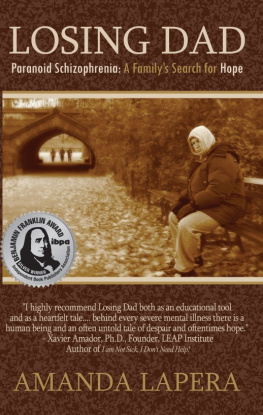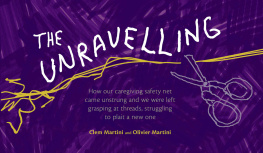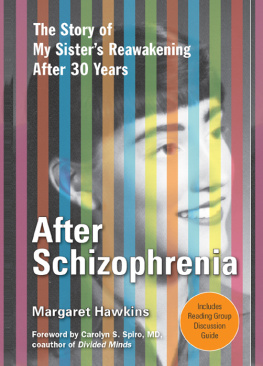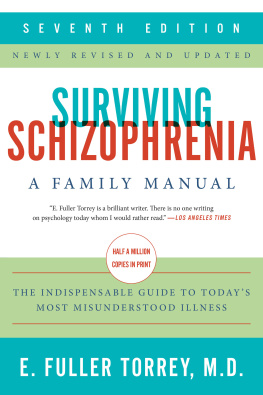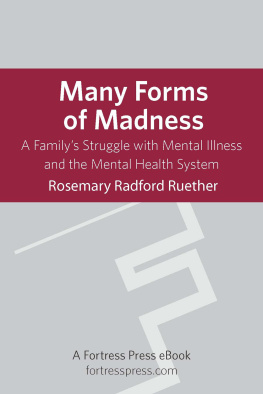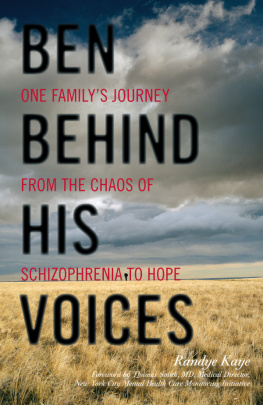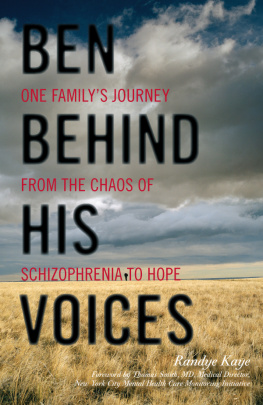Losing Dad
ParanoidSchizophrenia:
A Familys Search forHope
by
AmandaLaPera

Aliso Viejo,Calif.
Losing Dad, Paranoid Schizophrenia:
A Familys Search for Hope
Copyright 2013 by Amanda LaPera.
Published by Adamo Press at Smashwords.
This book is available in print atmost online retailers .
Smashwords Edition, License Notes
This ebook is licensed for your personalenjoyment only. This ebook may not be re-sold or given away toother people. If you would like to share this book with anotherperson, please purchase an additional copy for each recipient. Ifyoure reading this book and did not purchase it, or it was notpurchased for your use only, then please return to your favoriteebook retailer and purchase your own copy. Thank you for respectingthe hard work of this author.
Cover Designed by QuynhTran
PublishersCataloging-in-Publication
(Provided by QualityBooks, Inc.)
LaPera, Amanda.
Losing Dad : paranoidschizophrenia : a family's
search for hope / AmandaLaPera. -- First edition.
pages cm
Includes bibliographicalreferences.
LCCN 2013916680
ISBN978-0-9897037-2-7
ISBN 978-0-9897037-3-4(pbk.)
ISBN 978-0-9897037-5-8(ebk.)
1. Paranoidschizophrenia--Popular works.
2. Paranoidschizophrenics--Family relationships.
3. Anosognosia--Popularworks. I. Title.
RC514.L37 2013616.89'8
QBI13-600166
For Dad,
With love
A portion of the authorsproceeds from the sale of this book are donated to NAMI-OC, anaffiliate of the National Alliance on Mental Illness
To contact Amanda LaPera,and for information on her books and speaking schedule, go towww.amandalapera.com. You may also contact her through thepublishers website www.adamopress.com.
TABLE OFCONTENTS
PART ONE: DIAGNOSIS &SURGERY
Before DadsDisappearance
PART TWO: NOTICEABLECHANGES
PART THREE:CATACLYSM
Two Years after DadsDisappearance
Foreword
by Dr. XavierAmador
S chizophrenia, schizoaffective and bipolar disorder are biological brain disorders. One half of allpersons diagnosed with these disorders suffer from a symptom thatleaves them unaware they are ill and at odds with most everyonethat is trying to help them. If you didnt think you had a disease,would you take medication for it? From the time he was firstdiagnosed with schizophrenia and for the next two decades, this iswhat my brother Henry experienced. He knew he was not ill and allof us that loved him were equally certain he was and desperatelyneeded treatment. This unawareness symptomcalled anosognosiaandmy naive response to ittrying to educate Henry about an illness hewas certain he did not haveled to seven years of conflict betweentwo brothers who had always been close, respectful andtrusting.
Early in my career as aclinical psychologist, in the mid-1980s, I worked extensivelyevaluating neurological patients. I could not help but notice thesimilarities between the neurological syndrome called anosognosia (i.e.,unawareness of deficits, symptoms, or signs of illness) and poorinsight in persons with serious mental illness. Patients withanosognosia will frequently give strange reasonswhat neurologistscall confabulations to explain any observations that contradict their beliefsthat they are not ill. For example, one man I evaluated had been ina car accident and had suffered a serious brain injury, leaving himparalyzed on the left side of his body. When I asked him if hecould raise his left arm, he said he could, but was unable to doso. Even though his arm lay motionless, he still believed he couldraise it. When asked for an explanation he said, Youve donesomething to my arm, tied it down in some way. Such was hiscertainty that nothing was changed and all was well withhim.
There is now abundant research that linkssevere and persistent unawareness of having schizophrenia, bipolarand related disorders to functional and structural abnormalities inthe brain, usually involving frontal lobes. Some people,unfortunately, still believe that severe and persistent problemswith insight are only a consequence of denial (i.e. a copingmechanism) despite scientific consensus to the contrary. When I wasasked to co-chair the text revision of the Schizophrenia andRelated Disorders section of the DSM-IV-TR, together with myco-chair we called on experts in the field to review the scientificliterature and draft descriptions of the disorder that reflectedscientific consensus, not merely personal opinion. Here is whatthey found:
Associated Features and Disorders
A majority of individualswith Schizophrenia have poor insight regarding the fact that theyhave a psychotic illness. Evidence suggests that poor insight is amanifestation of the illness itself rather than a copingstrategycomparable to the lack of awareness of neurologicaldeficits seen in stroke, termed anosognosia. American Psychiatric Association Press, 2000. Page304
A word about how I met theauthor of Losing Dad . In response to my experiences trying to help my brother andcountless others with serious mental illness who had anosognosia, Idevelopedover many years of trial and errorthe Listen-Empathize-Agree-Partner (LEAP) communication program. Eventually, thisled to the creation of The LEAP Institute and the training of tensof thousands of family caregivers, health care professionals andeven law enforcement and corrections officers in a form ofcommunication that builds bridges to persons suffering alone withthese illnesses. Amanda LaPera was among those eager to learn adifferent way of interacting and communicating with her father whowas suffering from mental illness.
She first approached me after going througha similar struggle with her father, who displayed an unusual caseof late-onset severe mental illness. At the time, she did not knowabout the LEAP strategy. Her fathers dramatic transformation andsubsequent hallucinations and paranoia created a distance betweenhim and his loved ones. Like my brother, her father displayed poorinsight into his illness and refused treatment. He cycled throughinvoluntary mental hospitalizations before cutting contact with hisloved ones and ending up homeless. This tragic reality,unfortunately, is one lived by too many other families.
As I had done, Amanda LaPera found help withthe National Alliance on Mental Illness (NAMI), the largestgrassroots organization dedicated to helping those affected bymental illness. I encourage all family members, worldwide, who arestruggling with a mentally ill relative to investigate and becomeinvolved with a family advocacy group (like NAMI in the US) formany reasons, not the least of which is to feel less alone and moresupported in their quest to better the life of their mentally illrelative. I have learned much from NAMI and similar foreignorganizations that have followed its example. I have found greatcomfort in knowing not only that there are many other families likemine but also that there are forces at work to change mental healthlaws, fund research, and improve treatments.
Amanda LaPera gives a humanface to mental illness. Her book, LosingDad, Paranoid Schizophrenia: A Familys Search for Hope allows people who have not directly experiencedthe effects of a severe mental illness get a realistic glimpse intothe emotions and feelings of a family in crisis. Those who have aloved one with a severe mental illness can relate to her familysstory and gain a better understanding of this shared experience. Asa reader, you become a member of her family.
What impresses me mostabout her book, LosingDad , is the honesty and compassion she usesto expose how severe mental illness affects an entire family children, spouses, and parents. The research and interviews thatwent into the writing of this book add a level of authenticity thatallows the unbelievable to be believable. Beautifully woven betweenthe facts are the feelings. She shows that behind every severemental illness there is a human being and an often untold tale ofdespair and oftentimes hope. Rather than try to paint over herpast, she unapologetically opens up to her readers about words andactions she cannot take back. I highly recommend Losing Dad both as aneducational tool and as a heartfelt tale.
Next page
